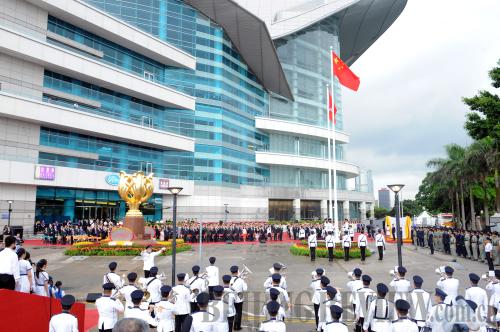|
 |
|
CELEBRATING A NEW ERA: A flag raising ceremony is held at the Golden Bauhinia Square in celebration of the 17th anniversary of Hong Kong's return to China on July 1 (HUANG BENQIANG) |
No stagnation
Experts believe the NPC Standing Committee's decision has offered a clear direction and provided guidelines for achieving the goal of universal suffrage in 2017. But there remains room to negotiate, such as how to make sure the selection of the nomination committee is more democratic.
"We cannot afford a standstill in our constitutional development or else the prosperity or stability of Hong Kong will be at stake. All Hong Kong people, irrespective of their political affiliations, should come together with one heart, one vision, to take forward the democratic development of Hong Kong, and to implement universal suffrage," said Leung.
He added that different opinions must be expressed peacefully, rationally and legally.
"The decision has clearly shown the Central Government's bottom line over the debates over the election procedures of the chief executive," Lau Siu-kai, emeritus professor of sociology of Hong Kong-based Chinese University and Vice President of the Chinese Association of Hong Kong and Macao Studies, told Beijing Review. He said that the Central Government has indicated that it would not back off on fundamental issues.
"It is really time for radicals to decide between these two paths: resisting the amendments to pursue their personal short-term gains or truly putting the long-term democratic development of Hong Kong first," said Professor Lau. He said that the leaders of those opposing the reform should lower their expectations of becoming chief executive and instead focus on maximizing their influence during the first round of universal suffrage.
Tai Yiu-ting, an associate professor of law at the University of Hong Kong and a co-founder of Occupy Central, admitted at an interview with the South China Morning Post on September 2 that his movement's strategy to win concessions from the Central Government on election reform had failed and that support for the sit-in was waning.
The adoption of the NPC decision represents the second step in Hong Kong's five-step electoral reform. The first step was that Leung filed a report to the NPC Standing Committee on issues relating to the election methods for the chief executive and Legislative Council on July 15 based on the five-month consultation.
During the following stages, the specific method of universal suffrage shall be prescribed in accordance with legal procedures through amending Annex I to the Hong Kong Basic Law. Such amendments must be endorsed by at least two-thirds of all the members of the Legislative Council and with the consent of the chief executive before being submitted to the NPC Standing Committee for approval.
If the specific method of universal suffrage for selecting the chief executive is not adopted in accordance with legal procedures, the method used for selecting Hong Kong's leader for the preceding term shall continue to apply, the decision said.
Li said whether Hong Kong could achieve universal suffrage depends on the subsequent steps, and called on "certain groups in Hong Kong to set aside prejudices and personal interests, showcase their political courage and wisdom to push forward universal suffrage in the 2017 election."
"Some might say that if we don't have universal suffrage in 2017, we could still redo everything in 2022. But I think if we miss the opportunity in 2017, Hong Kong may never have the chance to regain the momentum lost," he said.
Ng Leung-sing, the finance committee chair of the Legislative Council of HKSAR, said the mainstream public opinions in Hong Kong will play a significant role in the final results of Hong Kong's election reform during an interview with www.thepaper.cn on September 2. "If all voters decide that watching the 1,200 election committee members cast the ballots is not as good as casting their own ballots, the 'pro-democracy' legislators will have to take their opinions into consideration and turn to support the electoral changes in the decision," said Ng.
Proposed Election Process for HKSAR Chief Executive in 2017
- A broadly representative nominating committee will be formed, which must be consistent with the size, composition and methods of choosing its members of the election committee that chose the current chief executive in 2012.
- The nominating committee will endorse two to three candidates, each by a majority of all the committee members.
- Each eligible voter is entitled to pick one candidate.
- The winner of the election will be subject to appointment by the Central Government.
Email us at: lili@bjreview.com | 